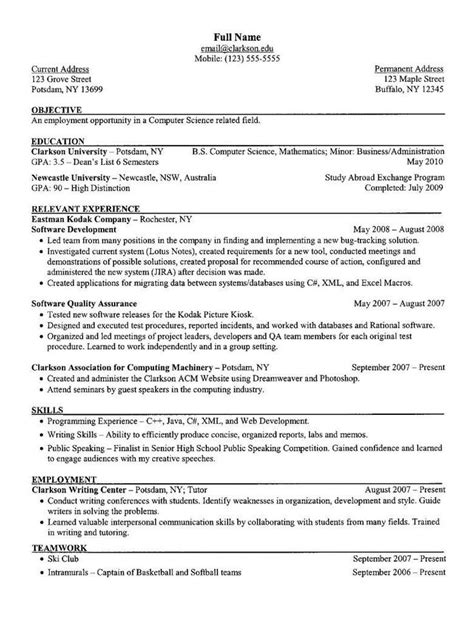Including Minor On Resume: Tips And Examples

When it comes to crafting a resume, it’s important to highlight your relevant skills, experiences, and education. One aspect that some job seekers may wonder about is whether or not to include their minor on their resume. While the decision ultimately depends on your individual circumstances and the job you’re applying for, including your minor can provide valuable information to potential employers. In this article, we’ll explore some tips and examples to help you decide if and how to include your minor on your resume.
1. Consider the relevance of your minor
The first thing to consider when deciding whether or not to include your minor on your resume is the relevance of your minor to the job you’re applying for. If your minor is directly related to the field or industry you’re pursuing, it can be beneficial to include it on your resume. For example, if you’re applying for a marketing position and have a minor in graphic design, including this information can demonstrate your additional skills and knowledge in the field.
2. Highlight your skills and knowledge
Including your minor on your resume can help showcase the additional skills and knowledge you’ve acquired through your coursework. This can be particularly useful if your minor is in a field that complements your major or if it provides you with unique skills that are relevant to the job you’re applying for. For example, if your major is computer science and your minor is in cybersecurity, including this information can demonstrate your expertise in a specialized area.
3. Use the right format
When including your minor on your resume, it’s important to use the right format to ensure clarity and readability. One common approach is to list your major and minor as separate entries under your education section. For example:
Bachelor of Arts in English
Minor in Creative Writing
Alternatively, you can choose to mention your minor in parentheses after your major. For example:
Bachelor of Science in Psychology (Minor in Sociology)
4. Emphasize your accomplishments
When including your minor on your resume, it’s important to emphasize any relevant accomplishments or experiences related to your minor. This can help demonstrate the practical application of your minor and showcase your ability to apply your knowledge in real-world settings. For example, if you completed a research project or internship related to your minor, be sure to highlight these experiences in your resume.
5. Tailor your resume to the job
As with any section of your resume, it’s important to tailor your minor information to the specific job you’re applying for. Take the time to carefully review the job description and identify any skills or qualifications that are particularly relevant to your minor. Then, highlight these skills and experiences in your resume to show how your minor can benefit the employer.
6. Be prepared to discuss your minor
If you choose to include your minor on your resume, be prepared to discuss it in more detail during job interviews. Hiring managers may ask you about your minor and how it relates to the job you’re applying for. Be ready to provide examples and explain how your minor has contributed to your overall skill set and qualifications.
7. Examples of including a minor on a resume
To provide some inspiration, here are a few examples of how you can include a minor on your resume:
Example 1:
Bachelor of Science in Biology
Minor in ChemistryExample 2:
Bachelor of Arts in History (Minor in Political Science)
Example 3:
Bachelor of Business Administration
Double Minor in Marketing and Finance
Conclusion
Deciding whether or not to include your minor on your resume is a personal choice that depends on the relevance of your minor to the job you’re applying for. If your minor is directly related to the field or industry you’re pursuing, it can be beneficial to include it on your resume to showcase your additional skills and knowledge. However, it’s important to tailor your resume to the specific job and be prepared to discuss your minor in more detail during interviews. By following these tips and examples, you can effectively include your minor on your resume and highlight its value to potential employers.
Frequently Asked Questions
Should I include my minor on my resume?
The decision to include your minor on your resume depends on the relevance of your minor to the job you’re applying for. If your minor is directly related to the field or industry you’re pursuing, it can be beneficial to include it to showcase your additional skills and knowledge.
How should I format my minor on my resume?
There are a few different ways to format your minor on your resume. You can list your major and minor as separate entries under your education section, or you can mention your minor in parentheses after your major.
If your minor is not directly related to the job you’re applying for, you can still consider including it on your resume if it provides you with unique skills or knowledge that may be beneficial in the workplace. However, it’s important to tailor your resume and emphasize the skills and experiences that are most relevant to the job.
Should I include my minor if it’s the same as my major?
If your minor is the same as your major, it may not be necessary to include it on your resume. However, if you have additional coursework or experiences related to your minor that are relevant to the job you’re applying for, you can still consider including it to showcase your additional skills and knowledge.
